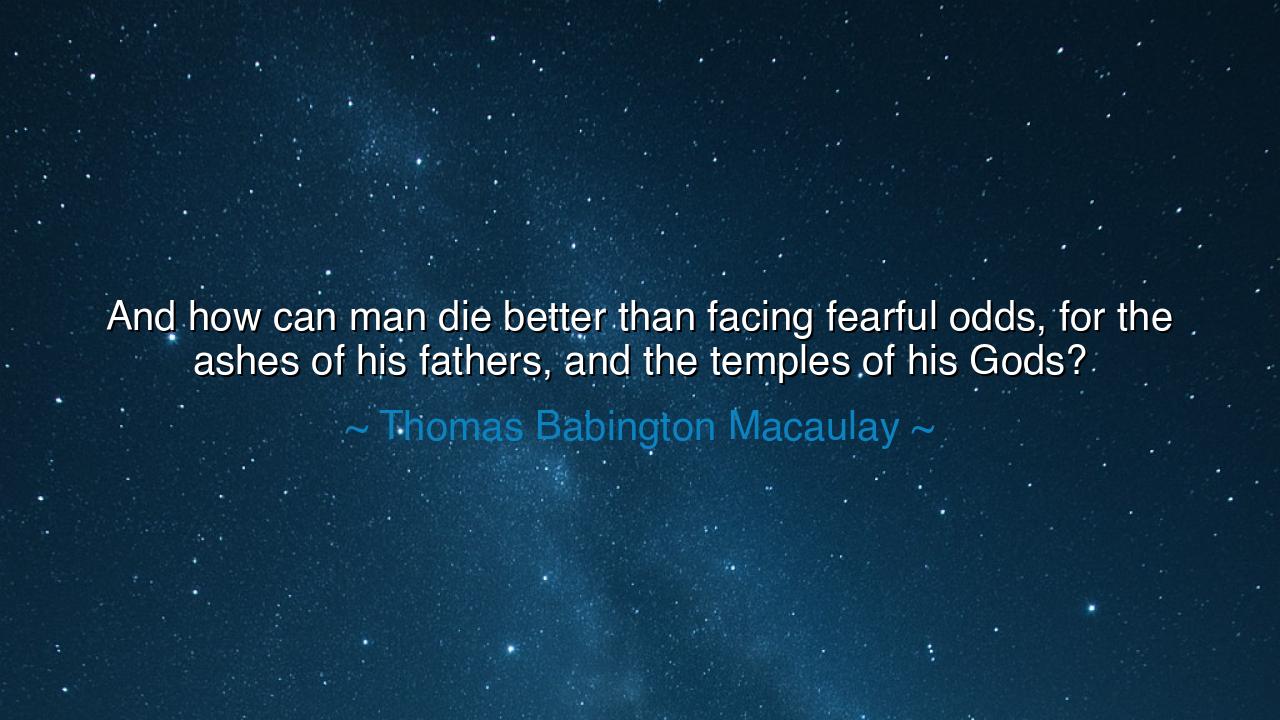
And how can man die better than facing fearful odds, for the
And how can man die better than facing fearful odds, for the ashes of his fathers, and the temples of his Gods?






The poet, historian, and statesman Thomas Babington Macaulay once wrote words that thunder with timeless valor: “And how can man die better than facing fearful odds, for the ashes of his fathers, and the temples of his Gods?” These lines, drawn from his epic Lays of Ancient Rome, echo across the ages like the beating of a war drum in the heart of civilization. They speak not merely of battle, but of the sacred duty that binds every human soul—to defend that which is holy, that which gives meaning to life: the memory of one’s ancestors and the faith that sustains one’s people. It is a call to courage, to sacrifice, and to the nobility that shines most brightly in the face of fear.
To face fearful odds is to stand before danger when all reason says retreat. It is the moment when the human spirit is tested—not in victory, but in defiance. Macaulay’s words arose from his deep reverence for the ancient Roman virtues of honor, duty, and loyalty. They recall the tale of Horatius Cocles, the Roman soldier who, as legend tells, held the bridge against the invading Etruscan army while his comrades destroyed it behind him. Alone he stood, a single man against an army, fighting not for glory, but for Rome itself—for the ashes of his fathers and the temples of his gods. In that moment, death was not defeat, but triumph. For Horatius died as one who had fulfilled the highest calling: to give his life for the eternal things that make life worth living.
The origin of these lines lies in Macaulay’s love of moral heroism. He wrote them in the 19th century, in an age that sought to rediscover the greatness of antiquity and to remind modern men of their spiritual heritage. In Lays of Ancient Rome, he retold old Roman legends in the form of heroic ballads, believing that the spirit of sacrifice, once revered in the ancient world, must never fade. His verse was not a glorification of war, but a hymn to integrity—to the idea that life gains its highest dignity not in ease or safety, but in the willingness to stand firm when all seems lost.
Macaulay’s words echo through history because they speak to something universal. Across ages and nations, the same truth resounds: the measure of a man is found in what he is willing to die for. Leonidas and his three hundred Spartans stood at Thermopylae against the Persian host, knowing death awaited them. Yet they did not waver, for they fought not for conquest, but for the freedom of Greece and the sanctity of their homeland. Like Horatius, they faced fearful odds for the ashes of their fathers and the temples of their gods. Their bodies perished, but their courage became immortal, carved forever into the memory of humankind.
Yet the lesson of this quote is not confined to warriors or battlefields. Each person, in their own life, must face fearful odds—moments when doing what is right demands sacrifice. The ancient struggle lives on in smaller, quieter forms: the worker who stands for truth against corruption, the mother who protects her child through hardship, the soul that holds fast to faith when surrounded by despair. Each act of courage, no matter how small, is a defense of the sacred—the ashes of our fathers, the wisdom and values passed down through generations, and the temples of our gods, the sanctuaries of conscience within each human heart.
To die better, as Macaulay wrote, is not to seek death, but to live in such a way that when death comes, it finds one worthy. The man who faces his trials with honor, who guards what is right even when the world turns dark, dies better than the one who flees his duty or lives only for comfort. The ancients called this virtue—the harmony between action and moral truth. In this, Macaulay speaks to the eternal warrior within every human being: the part of us that longs to live meaningfully, not merely to survive.
So, my child, remember this: to live well is to be ready to die well. When fearful odds arise—and they will—meet them not with despair, but with courage rooted in love. Defend the values that make you human: your faith, your honor, your compassion, your family. The ashes of your fathers are the stories that shaped you; the temples of your gods are the truths that guide you. Protect them with your strength, and carry them forward with your heart. For though death comes to all, only those who live with purpose conquer it.
In the end, as Thomas Babington Macaulay reminds us, the noblest death is not in the body’s fall, but in the soul’s rising—the death that affirms life’s deepest meaning. To face fearful odds for the sake of what is sacred is to transcend mortality itself. For the man who dies for truth and love does not truly die—he becomes, like Horatius, like Leonidas, a flame that time cannot extinguish.






AAdministratorAdministrator
Welcome, honored guests. Please leave a comment, we will respond soon